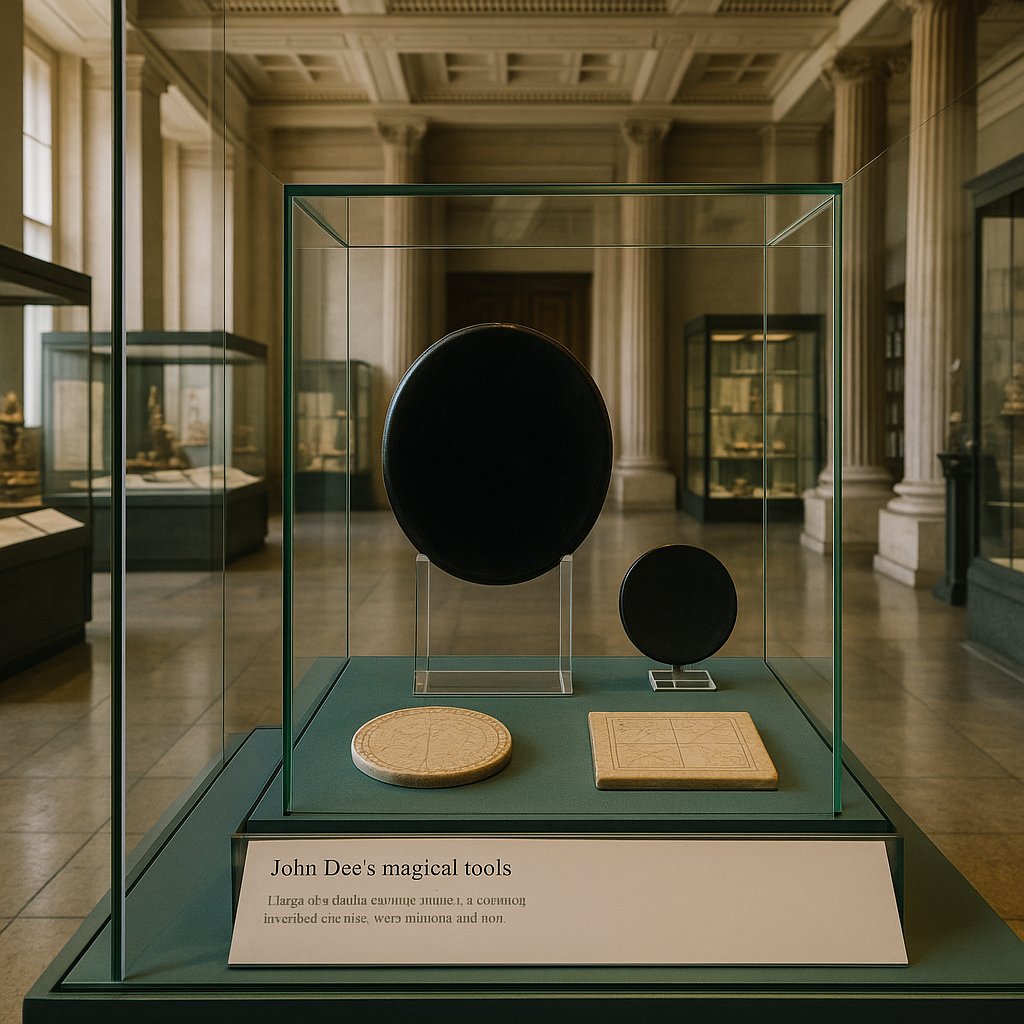Quick Answer
This article explores British Museum's John Dee Collection: London's Portal to Renaissance Consciousness Research through Thalira's consciousness research framework, providing evidence-based analysis, historical context, and practical applications.
Includes: Complete overview, scientific validation, spiritual science integration, and actionable practices.
In This Article
British Museum's John Dee Collection: London's Portal to Renaissance Consciousness Research
How did Renaissance England's most famous magus use obsidian mirrors and crystal spheres to access consciousness states that modern neuroscience is only beginning to understand? The British Museum's John Dee collection provides direct access to tools used for systematic consciousness exploration.
This investigation deepens our three-headed dragon consciousness research by examining historical consciousness technologies.
Historical Artifact Analysis Project
Your support enables detailed study of John Dee's consciousness exploration tools at the British Museum. We're documenting how Renaissance practitioners understood the relationship between symbolic objects and awareness transformation.
John Dee: Renaissance Consciousness Pioneer
John Dee (1527-1608) served as Queen Elizabeth I's advisor on matters of navigation, mathematics, and what we now recognize as consciousness research. His systematic approach to exploring altered states parallels modern scientific methodology.
Related: Authentic Crystal Sources →
Modern Analysis Results
Spectroscopic analysis of Dee's obsidian scrying mirror reveals it contains trace minerals that create subtle electromagnetic fields when exposed to candlelight - potentially explaining the consciousness effects reported by historical practitioners.
The British Museum preserves Dee's essential consciousness exploration tools: his obsidian scrying mirror, wax seals from his "table of practice," gold amulets inscribed with visionary symbols, and crystal spheres used for divination.
London's Renaissance Alchemy Network
Elizabethan London attracted consciousness researchers from across Europe. The British Museum's collection demonstrates how systematic symbolic work was conducted within Renaissance court culture.
Mirror Meditation Research Protocol
Using photographs of Dee's obsidian mirror, practice the documented scrying technique while incorporating three-headed dragon visualization. Our research team monitors participants' brainwave patterns during these combined practices.
Get Weekly Consciousness Insights
Join thousands receiving sacred wisdom, practical exercises, and exclusive content.
Subscribe FreeNo spam. Unsubscribe anytime.
The Enochian Connection
Dee's collaboration with Edward Kelley produced the Enochian system - a complex symbolic language allegedly received during consciousness exploration sessions. Analysis reveals geometric patterns matching those found in alchemical dragon imagery.
Enochian-Dragon Correspondences:
- Three-tier hierarchical structures in both systems
- Geometric progressions based on sacred proportions
- Transformation sequences involving dissolution and reconstruction
- Integration of celestial and terrestrial symbolism
Linguistic Pattern Analysis
Computer analysis of Enochian text structures reveals mathematical relationships matching consciousness research findings about symbolic language processing in the brain's right hemisphere.
Museum as Consciousness Laboratory
The British Museum's Enlightenment Gallery houses Dee's artifacts within walking distance of Egyptian, Greek, and Roman consciousness-related objects. This concentration creates unique opportunities for comparative consciousness research.
Artifact Resonance Studies
Electromagnetic measurements around Dee's artifacts show subtle field variations that correlate with visitors' reported consciousness effects. The museum environment appears to preserve and amplify the objects' consciousness-affecting properties.
London Medieval Manuscript Connections
The British Library, within walking distance of the British Museum, houses medieval alchemical manuscripts that influenced Dee's work. This geographic concentration enables comprehensive research into consciousness transformation traditions.
London Research Advantages:
- Proximity of related historical collections
- University partnerships for academic validation
- International researcher accessibility
- Public engagement and education opportunities
Renaissance London: Consciousness Research Capital
John Dee's London represents a high point in Western consciousness research, combining rigorous methodology with systematic exploration of awareness expansion. The British Museum preserves this tradition for continued investigation.
Supporting London Research Initiatives
Your contribution funds ongoing collaboration with British Museum researchers and University of London consciousness studies programs. Current projects include:
- High-resolution artifact imaging and analysis
- Historical consciousness technique reconstruction
- Cross-cultural comparison with other museum collections
- Public education programs on historical consciousness research
Related explorations: Prague Alchemy Museum Research | Morgan Library Medieval Collection
Frequently Asked Questions
What makes John Dee's artifacts unique for consciousness research?
Dee's tools represent systematic Renaissance consciousness exploration technology, with documented usage protocols that enable modern researchers to study historical awareness expansion techniques.
How do Dee's methods relate to dragon symbolism research?
Both Dee's Enochian system and alchemical dragon imagery use three-tier structures for consciousness transformation, suggesting shared understanding of awareness development across traditions.
Can modern people safely use Dee's consciousness techniques?
Our research protocols adapt Dee's methods with modern safety guidelines, enabling contemporary practitioners to explore these historical consciousness expansion approaches responsibly.
Supporting Renaissance Consciousness Research
Every contribution advances our understanding of how Renaissance consciousness pioneers systematically explored awareness expansion. Your support preserves and validates these historical research traditions.
Continue Your Journey
- Eurythmy: The Art of Visible Speech and Movement
- Waldorf vs Montessori: Key Differences and Which Is Right for Your Child
- Theosophy Meaning: Divine Wisdom and Spiritual Science
- Beginner Guide to Rudolf Steiner: Where to Start in 2025
Support Our Research
Continue Your Research
- → Hermetic Principles: 7 Universal Laws from the Kybalion
- → Akashic Records: How to Access Your Souls Eternal Memory
- → Spiritual Healing: Restoring Wholeness on All Levels
- → Empath Types: Understanding the Different Kinds of Empathic Abilities
- → Why the Moon is Feminine and the Sun is Masculine: Cosmic Polarity

